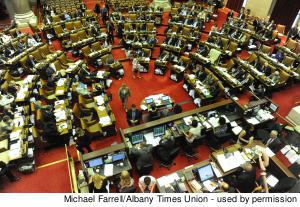The State legislature passed a bill that would guarantee future funding for costs at CUNY and SUNY that are deemed mandatory, including such collective bargaining costs as salary and benefit increases.
 |
Also classified as expenses covered by the guarantee are those that cover the general maintenance of facilities and other fundamental needs. If signed by Governor Andrew Cuomo, the law would begin to apply for fiscal year 2016-2017, which begins in April of next year.
Bipartisan Effort
Deborah Glick, a Manhattan Democrat and graduate of Queens College, and State Senator Kenneth LaValle, a Long Island Republican whose district includes SUNY-Stony Brook, sponsored the maintenance-of-effort bills in their respective legislative bodies, where each chairs the chamber’s higher education committee. The bill, if signed by the governor, modifies the maintenance-of-effort language in a law known as NYSUNY 2020, which sets a minimum level of annual State funding for CUNY and SUNY at no less than the previous year’s allocation. When SUNY 2020 passed in 2011, it also enacted five years of tuition hikes at CUNY and SUNY; lawmakers said the increases would go toward improvements to the education system – such as the hiring of additional faculty and staff and other educational enhancements. Instead, increased tuition revenues were diverted to stopgap measures to address problems presented by crumbling buildings and general operating costs. The current State budget leaves CUNY with $63 million in unfunded mandatory costs.
The bill now awaits the signature of Governor Cuomo, who, throughout the summer, is expected to review bills passed by the legislature in the session is concluding as we go to press. While the MOE bill would guarantee future funding for CUNY, the union is working on a separate proposal – a one-time $240 million investment in CUNY – that would cover retroactive salary increases. If secured per the terms of the proposal, the money would be drawn from the State’s budget surplus, and would help to fund a settled contract once an agreement is reached.
____________________________
RELATED COVERAGE

